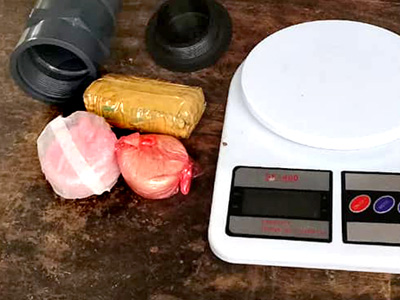News
Laws need to be updated to facilitate disposal of narcotics in custody: Official
Large consignments of narcotics have been taken into custody by law enforcement authorities during the last few months.

Narcotics are weighed under supervision Pic by Augustine Fernando
Hundreds of kilos of heroin, cocaine, synthetic drugs such as ‘Ice’ and the prevalent cannabis are held as evidence in courts across the island. However, little is known about what becomes of the stockpile of evidence.
In January this year, 928 kgs of seized cocaine valued at Rs16.7 billion was publicly destroyed in Puttalam. The Police Narcotic Bureau (PNB) and the Government Analyst’s Department liquefied cocaine, which was then transported in a special hazardous waste disposal vehicle to its facility in Puttalam, where it was destroyed in an incinerator at a temperature of above 2000 centigrade. It was the first time such a volume of seized narcotics was destroyed publicly according to Dr Samatha Kithlawalaarchchi, head of the Presidential Task Force on Drugs. “At present, Court clearance is required to publicly destroy drugs kept as evidence,” he explained, pointing out that laws need to be changed to enable law enforcement and court authorities to safely dispose of drugs.
The laws that govern what happens to items deemed as evidence state that such evidence be kept until the Court proceedings are concluded. Dr Kithlawalaarchchi stressed the need for laws to be updated to facilitate disposal of such stocks of narcotics held in custody.
Unpublicised disposal of narcotics in small batches under the supervision of the PNB and Court officials takes place around the country, said an official at the National Dangerous Drugs Control Board (NDDCB) who wished to remain anonymous. “The disposal of cocaine in January was done at a significant cost; however it is important to show the public that they are being destroyed,” he said, pointing out that such publicised destruction acts as a deterrent and ensures that the drugs kept in custody do not end back on the street. Cannabis can be burnt in a depopulated area as the smoke does not spread far and the chemicals breakdown easily, he said.
The NDDCB officer explained that the disposal of narcotics was a lengthy process, “once permission from Court is obtained, depending on the chemical composition, some drugs need to be chemically broken down to ensure they can be disposed of safely,” he said. “Synthetic drugs are a challenge because each batch usually has a different chemical composition,” he added. The Government Analyst’s department and NDDCB follow international standards laid out by the United Nations.
Internationally, many countries publicly destroy narcotics and other contraband taken into custody shortly after a sample of the product is taken and the consignment weighed under Court supervision: A practice which ensures transparency and prevents the evidence reappearing in the streets.

